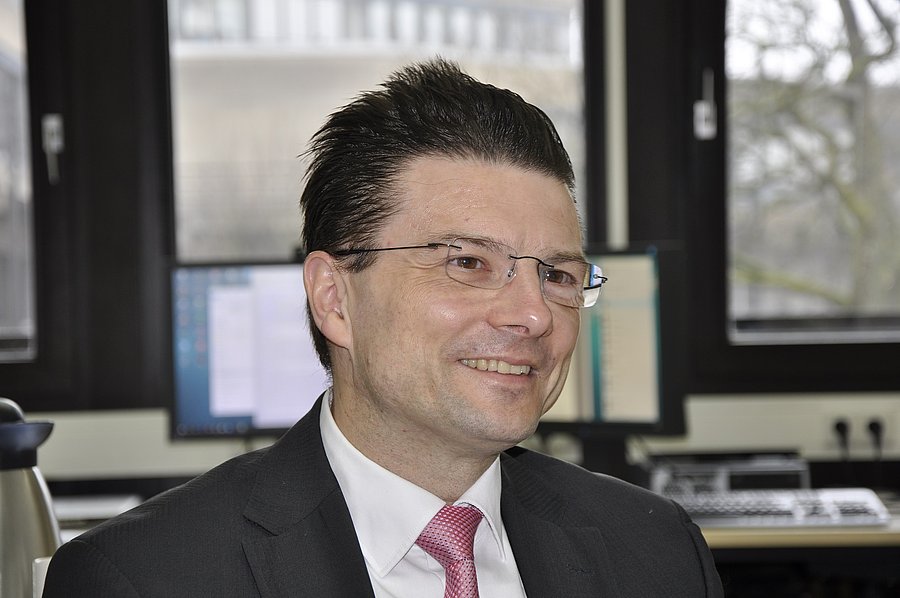
Prof Dr Stefan Bock / Economics
Photo: UniService Transfer
Every university that wants to get ahead needs computer science
WINFOR head Professor Dr Stefan Bock optimises almost everything
WINFOR stands for Information Systems and Operations Research, a chair within the Schumpeter School of Business and Economics at the University of Wuppertal.
As extensive as the description is within the university, the challenges on which the chair holder, Prof Dr Stefan Bock, researches and works are all the more specific.
Process optimisation is the topic, i.e. the sensible, mathematically accurate definition of complex processes in companies in the private sector. And so it began...
From game programmer to fascinated computer scientist
In order to fulfil his interest in mathematics, the native of Bielefeld and avowed Borussia Mönchengladbach fan (there is a life outside of teaching) decided to study computer science (with a minor in business administration) at the University of Paderborn after completing his military service. He initially wanted to improve his knowledge of programming - or more precisely, game programming - but then found more and more exciting answers to no less challenging questions that had been on his mind for a long time. His interest in the subject developed and solidified during his studies. His first career aspiration - after successfully completing his doctorate in business administration - was a job in management consultancy, because, as he says today: "Some entrepreneurs often don't know what data is available in the company and what can be done with it in a meaningful way."
America, here I come
A three-month research stay took him to the United States in 2006 (and again in 2007), where his image of an America for scientists was formed. And his enthusiasm knows no bounds. He found the atmosphere at the Leonard N. Stern School of Business at New York University under Professor Pinedo to be extremely interesting, extremely research-orientated and, thanks to the close contact with his fellow professors, absolutely efficient. Even the spartan life in a Jewish youth hostel in Manhattan - flats there are unaffordable - was something he could get a lot out of. No comfort, but pure Jewish life and intercultural contacts that leave a lasting impression. This is why he generally favours and supports stays and cooperation abroad. It was during this time that he was offered a professorship at the University of Wuppertal, which he accepted in 2006.
WINFOR all?
Mathematical algorithms are his hobbyhorse and he uses them today to optimise certain processes. In the interview, he explains this using the example of vehicle routing (route planning) for newspaper delivery in Dortmund. Among other things, WINFOR simulates and optimises the routes of the vehicles used for effective newspaper delivery and integrates all new orders that need to be taken into account in the ongoing process in real time, always in order to minimise customer dissatisfaction.
Bock, S., Ferrucci, F.: A proactive approach to real-time control of vehicle routing processes using multiple profiles[1].
To this end, Bock and his department analyse historical data from incoming orders, which he assigns in terms of location and time and then condenses back into so-called clusters that meet specific quality criteria. This enables the programming to predict the probability of an event occurring (e.g. a new order in a certain neighbourhood) based on past values and to react promptly or send vehicles there proactively.
The seemingly abstract number games then become visible in concrete operational issues and processes. The routes required for the newspaper delivery mentioned above can thus be organised sensibly and highly efficiently. This procedure can be transferred to many other complex work processes, and the requests are therefore varied and challenging for the chair. Other examples include the synchronisation of conveyor belts or container control systems in ports.
Decision-making is profit
Professor Bock is certain that computer science is the future and says confidently: "A university that wants to move forward today without computer science has a problem". In order to remain competitive, companies will need the support of business informatics and operations research in all decision-making processes.
Perhaps future collaborations between business and academia will lead to graduates being able to continue their studies at university with the aim of gaining a doctorate, while at the same time being given their first specialist responsibilities in business practice. Professor Bock would like to see this dual-track further qualification, because this opportunity and the implementation of the knowledge gained from process optimisation would be a WINFOR all. And that's what transfer is all about.
Uwe Blass (interview from 20/03/2017)
[1] Ferrucci, F.; Bock, S.: Pro-active real-time routing in applications with multiple request patterns. European Journal of Operational Research Vol. 253(2), pp.356-371, 2016.
Prof Dr Stefan Bock studied computer science in Paderborn from 1993 with a minor in business administration, in which he also completed his doctorate and habilitation. From 2004 to 2006, he worked there as a university lecturer for business informatics. After a research stay at the Leonard N. Stern School of Business at New York University (NYU), he took over as Professor of Information Systems and Operations Research at the University of Wuppertal in October 2006.
